 Amphibious armored vehicle unit conducts open sea drill
Amphibious armored vehicle unit conducts open sea drill
 Water relay in Henan
Water relay in Henan
 Ethnic culture feasts eyes of travelers
Ethnic culture feasts eyes of travelers
 80 security dogs assembled in Nanjing police dog training base
80 security dogs assembled in Nanjing police dog training base
 Graffiti artists paint on street walls in Xinjiang
Graffiti artists paint on street walls in Xinjiang
 Story of ceramic artist Zhang Lingyun
Story of ceramic artist Zhang Lingyun
 Magic summer night dream in Hongyuan
Magic summer night dream in Hongyuan
 Incredible creatures in headwaters drainage region of Lancang River
Incredible creatures in headwaters drainage region of Lancang River
 The future of rock n' roll seen in young rockers in China
The future of rock n' roll seen in young rockers in China
 Magnificent Yanziya Cliff
Magnificent Yanziya Cliff
BEIJING, Aug. 15 -- Japanese war criminal Kiichi Kobayashi ordered the killing of at least 29 Chinese, including soldiers and civilians captured by Japanese aggressors, according to his written confession published on Friday.
Kobayashi, who was convicted after the end of WWII, served as unit commander of the Mukden Military Police during the Japanese invasion of China.
According to his confession, he ordered his subordinates to kill nine Chinese who were held in Zhangjiakou No. 1 Prison by the Japanese army on September 3, 1937.
On September 15 of the same year, Kobayashi ordered the murder of a Chinese soldier, who was captured by the Japanese army, in a field two kilometers west of Datong.
According to his confession, available on the State Archives Administration (SAA) website, on August 11, 1945, Japanese aggressors killed imprisoned Chinese because "it is not appropriate to release these wartime enemies." Kobayashi did not specify the number of people murdered that day.
Meanwhile, the document revealed that the Japanese army used Chinese for medical experiments.
Kobayashi recalled that he ordered his subordinates to send a Chinese detainee to the military surgeon for an appendectomy experiment in November 1935. The person was later killed by Kobayashi's subordinates, along with another 3 Chinese, on the riverside one kilometer north of Chifeng.
In September 1936, Kobayashi's subordinates sent a Chinese by truck to the Manchurian Railway's Chifeng Hospital, where Japanese surgeons injected poison into him and dissected him after he was killed.
He also recalled that he sent "Soviet spies" to Ishii Unit in Harbin for bacteria testing in January 1944.
Additionally, Kobayashi's confession revealed the murder of 12 Chinese on a riverside to the north of Chifeng from July to October 1936 and another two Chinese on a grassland one kilometer east of Zhangjiakou on September 4, 1937.
The document is the latest of 45 Japanese war criminal confessions the SAA plans to publish. It has been issuing one per day since July 3.
The move follows denials of war crimes by Japanese Prime Minister Shinzo Abe and right-wing politicians.
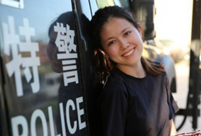 Beautiful policewoman in an anti-terrorism SWAT team
Beautiful policewoman in an anti-terrorism SWAT team Cute photos of little Taoist nuns and monks go viral online
Cute photos of little Taoist nuns and monks go viral online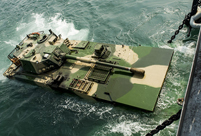 Amphibious armored vehicle unit conducts open sea drill
Amphibious armored vehicle unit conducts open sea drill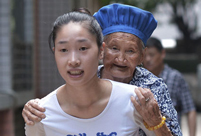 A post-90s girl who takes grandma to work
A post-90s girl who takes grandma to work Beijing policewomen posters become a hit
Beijing policewomen posters become a hit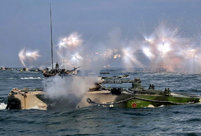 Armored regiment trains on the sea
Armored regiment trains on the sea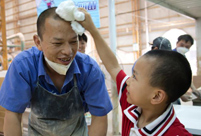 Children spend 'Father's Day' with dads at work
Children spend 'Father's Day' with dads at work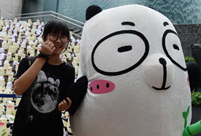 'Pan Da' appear in Shanghai World Financial Center
'Pan Da' appear in Shanghai World Financial Center Champions take selfies on podium
Champions take selfies on podium The vanishing folk skills
The vanishing folk skills Intoxicating beauty of Dali, Yunnan province
Intoxicating beauty of Dali, Yunnan province Memorable moments of Ludian earthquake
Memorable moments of Ludian earthquake Bring world together to help elephant
Bring world together to help elephant 'Building Dreams'
'Building Dreams'  Labrang Monastery
Labrang MonasteryDay|Week|Month